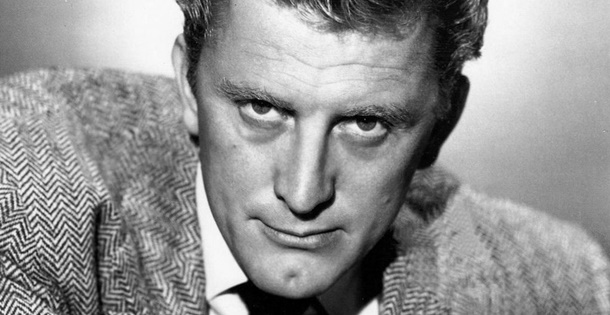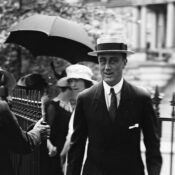The Post interviewed Kirk Douglas at in 1957 and again in 1986. Thirty years later, on the occasion of his 100th birthday on December 9, we share these earlier interviews.
The first time the Post interviewed Douglas, he was 40 years old, and some of his best work still lay ahead of him.
He had yet to star in Gunfight at the O.K. Corral, Paths of Glory, Seven Days in May, or the quintessential Douglas film, Spartacus.
In that 1957 interview, he talked of the hard times he’d known growing up in the 1920s.
“For my lunch at school, ma beat up one egg with water, then she fried the egg and cut it in half to make two sandwiches for me. There was no butter on my sandwich bread. If I had a nickel I bought milk to slosh it down; otherwise I drank water. Whatever we had to eat, whether it was boiled soup bones, stale bread or pumpernickel, we ate every scrap. That habit has lasted all my life. I seldom leave anything on my plate.”
He took whatever work he could find. “I’ve held down more than forty jobs in my life. Among other things, I’ve been a dishwasher, a punch-press operator, a cashier, a night watchman, a lifeguard.” He worked his way through college as a janitor, then talked his way into drama school.
It was while working in summer stock that a director helped him settle on a stage name. He thought his original name, Issur Danielovitch, “sounded like a sneeze reverberating in a bowl of borsch.” A “glossier label,” he thought, “would raise my audience appeal. I chose the name Douglas— I can’t remember why. Perhaps if a psychiatrist drained my mind he would find the name ‘Douglas Fairbanks’ floating in the sludge. Anyhow, I remember that we decided to put Kirk in front of Douglas because it would sound ‘snazzy’.”
Thirty years after that interview, the Post interviewed him again as he approached his 70th birthday. He talked about his new movie and his work with co-star Burt Lancaster. He also referred to the acting career of his son, Michael, who’d won an Oscar for producing the movie One Flew Over the Cuckoo’s Nest and had already starred in several popular films by that year.
Back in 1986, Douglas had no plans to retire. He continued working in film until 2008.
Now, with another thirty years passed, the Post is happy, again, to wish Kirk Douglas a happy birthday.
“Tough Guy” Kirk Douglas
By Donald Chase
October 1986
Soon to be 70, with 73 movies behind him, Hollywood’s versatile hero is still looking for obstacles to overcome.
“I’m extremely flexible—very few people can do this,” Kirk Douglas says with just a touch of braggadocio. In sneakers and exercise suit, the screen legend bolts from the plush easy chair in his Manhattan hotel suite and goes into a flatfooted squat with his buttocks just inches off the floor. There’s no strain in his tanned face. Only the quizzical creases in his brow, the smile lines about his eyes and mouth, and the gray in his thick, sandy hair betray his age, 69. And that number doesn’t stop him from sprinting across the top of a moving train with his costar, Burt Lancaster, in the new Disney action comedy Tough Guys.
Douglas has always been tough, but flexible, in more ways than one. He risked going against the prevailing nice-guyism of postwar leading men to play Champion‘s exploitative boxer, arguably Hollywood’s first “antihero.” One of the first actors who produced their own films, he created starring roles for himself as well as a platform for important issues. His company, Bryna Productions (named after his mother), made the controversial 1957 antiwar statement Paths of Glory and broke the infamous Hollywood blacklist by hiring Dalton Trumbo to write Spartacus. Last year, Bryna made the TV movie Amos, on the prickly subject of elderly abuse.
“As an actor and a producer,” Douglas says reflectively, “I’ve always been drawn to stories about people overcoming obstacles. I’m sure it must be because I’ve had to overcome so many myself.” Douglas was born Issur Danielovitch in Amsterdam, New York, one of seven children of an impoverished immigrant Russian-Jewish peddler and his wife. “But also,” he adds, “I believe that challenge is what keeps you young, strong, and flexible, physically and mentally.”
The physical challenges Douglas sets for himself these days may be a tad less strenuous than those of his youth. The former collegiate wrestler prefers a moderate regimen of calisthenics, weight lifting, walking, and tennis, and “though you don’t have to be a monk,” a low-cholesterol diet and low alcohol consumption. But his mental challenges are as rigorous, now that he’s a successful actor and the owner of homes in Beverly Hills and in Palm Springs, as when he was a struggling performer trying to afford Saint Lawrence University and the American Academy of Dramatic Arts. And his skills are as avidly courted.
“That’s why,” he says, “I don’t keep any of my awards around; they’re all packed away.” They include three Academy Award nominations (for Champion, The Bad and the Beautiful, and Lust for Life) and the Presidential Medal of Freedom, conferred upon him by President Carter for his good-will work worldwide. “They’re the past, and I’m looking forward to future challenges. When people want to know when I’m going to stop making movies, I always say, ‘When they stop asking me to, and when I no longer find them challenging,’ ” he says.
“They,” the Disney people, asked Douglas and Lancaster to costar in Tough Guys after seeing a film clip, shown on the 1984 Academy Awards telecast, from an Oscarcast of the late 1950s. The two sang a sour-grapes spoof called “It’s Great Not to Be Nominated This Year.” The duet was a reminder of the rapport the actors had developed in six movies together: Walk Alone, Gunfight at the OK Corral, The Devil’s Disciple, Seven Days in May, The List of Adrian Messenger, and the made-for-TV Victory at Entebbe. And in 1981, Lancaster and Douglas played the aging Huck Finn and Tom Sawyer, respectively, in a San Francisco staging of The Boys in Autumn a Broadway hit…
Working again with Lancaster triggered memories of 30 years ago. “When Burt and I were on location in Tucson for Gunfight at the OK Corral in 1956,” Douglas recalls, “we used to have dinner together every night and talk until one-thirty or two in the morning.” But for all that Douglas and Lancaster did — and do — have to talk about, Douglas says they are “not close, intimate friends. A year might go by when we don’t see each other, except at industry functions. And yet I feel that if I needed Burt and called on him, he’d be there. And 1 think he feels the same way about me.
“I’m probably more gregarious,” Douglas adds. “But then I’m married” — for 32 years to a Belgian-born former publicist, Anne Buydens — “and now Burt is not, and I think that makes a difference.”
One similarity Douglas finds in himself and Lancaster is their determination to give value for money. “We’re both hard working; we’re always on time — professional. Maybe it’s because we’re both closer to the hard-work ethic of the immigrant generation than a lot of today’s actors, but we couldn’t conceive of holding up production. When we were coming up, we used to average three pictures a year—Tough Guys is my 73rd — and to make just one picture a year now, forget about one every three years as Warren Beatty and Dustin Hoffman do, seems like sloughing off,” he says.
Douglas didn’t know if his four sons would have the incentive to make it in show business. “I always figured that by starting life with nothing, by having nowhere to go but up, I really had all the advantages,” he says. “My sons didn’t have the same impetus — the old man could take care of them if things didn’t work out. And the chances for success in the movie business are so remote, especially for actors, who constantly face rejection and just can’t help but take it personally. So 1 advised each of them from entering it — you see, I felt that if you could discourage somebody from going into it, they shouldn’t be in it.”
None of the boys was discouraged. Michael, now 42, won an Academy Award for producing One Flew over the Cuckoo’s Nest —a personal vindication for dad, who had starred, none too successfully, in a Broadway version of the material and failed to get it going as a film. Michael also did double duty as actor and producer in The China Syndrome, Romancing the Stone, and the latter’s sequel, Jewel of the Nile.
Douglas says of his sons; “Possibly, in the past, they might have learned something from me, but I now learn a lot more from them. 1 ask more questions than they do; they keep me au courant. And Peter, don’t forget, brought the Amos project to me, not the other way around. Working on it with him was so gratifying because it was not the father looking down on the son, but if anything, the son looking after the father.” As for Michael, “I said to Burt Lancaster on that Academy Awards show, ‘If 1 had known he was going to be so important, I would have been nicer to him when he was young!’ ”
Yet Michael’s professional success is not what makes his father happiest. “It’s that he’s done so many things to help other people,” Douglas says. “It’s that he gets involved, that he went to Central America about a year ago and got people from both ends of the political spectrum to come to Los Angeles for a discussion of their differences. He’s backing a theater group in Santa Barbara composed only of handicapped kids. Those are the things 1 admire most about Michael. Because that’s character. Then, secondly, 1 admire him as an artist.”
Michael is, in a way, just a chip off the old block. For 20 years Kirk Douglas has been traveling the globe at his own expense for the United States Information Agency and addressing student groups about America. He also made a TV documentary about the Afghanistan refugees fleeing Soviet domination.
“I use myself as the most immediate example of what America means,” Douglas says. He likes to recall taking his immigrant mother in a limousine to see the block-long Times Square billboard announcing “BRYNA PRESENTS SPARTACUS. His mother was not overwhelmed, as he had expected. She simply remarked, as she had so often before: “America is a wonderful land.”
“It was as if to say, ‘Well, of course, this can happen here,’ ” Douglas says. “She believed that, and she also instilled in me a sense of paying back. That’s why, having benefited from our system and having the opportunity, I try to do something in return from time to time.”
Though it was President Carter who awarded Douglas the Medal of Freedom for his unofficial ambassadorial work, the actor’s trips have taken place under both Democratic and Republican administrations.
“It’s something that I try to divorce from politics,” he stresses. “Not that I don’t have strong opinions about politics, because I do. In the past I’ve supported various candidates, [but that can be] difficult and dangerous.” It’s dangerous, he says, because “people in my position, with access to the media, have an unfair advantage. I also shy away from it now because I feel that sometimes politicians will use an actor like a hunk of meat.” And he feels it’s difficult because partisanship might diminish his clout as a spokesman on “themes that affect us all in a humanitarian way.”
His latest cause is elderly abuse, “which is universal,” he says. “Republicans get old; Democrats get old; Communists get old.” He has written about the subject in the New York Times and spoken on it at a Congressional hearing; he used the research he did for Amos.
“I was appalled,” Douglas says, “at the kind of abuse the elderly suffer.”
Douglas refuses to wear blinders against his country’s defects. “I think we have the best system,” he says, “but it can remain so and become better, stronger, only if we recognize that we have faults and work to correct them, whatever the obstacles.” And though we may never reach perfection, he says, either as individuals or collectively, we must never stop striving. “There’s a passage in Browning,” Douglas says, “that goes: ‘A man’s reach should far exceed his grasp/Else what’s a heaven for?’ “
Featured image: Wikimedia Commons / public domain
Become a Saturday Evening Post member and enjoy unlimited access. Subscribe now



